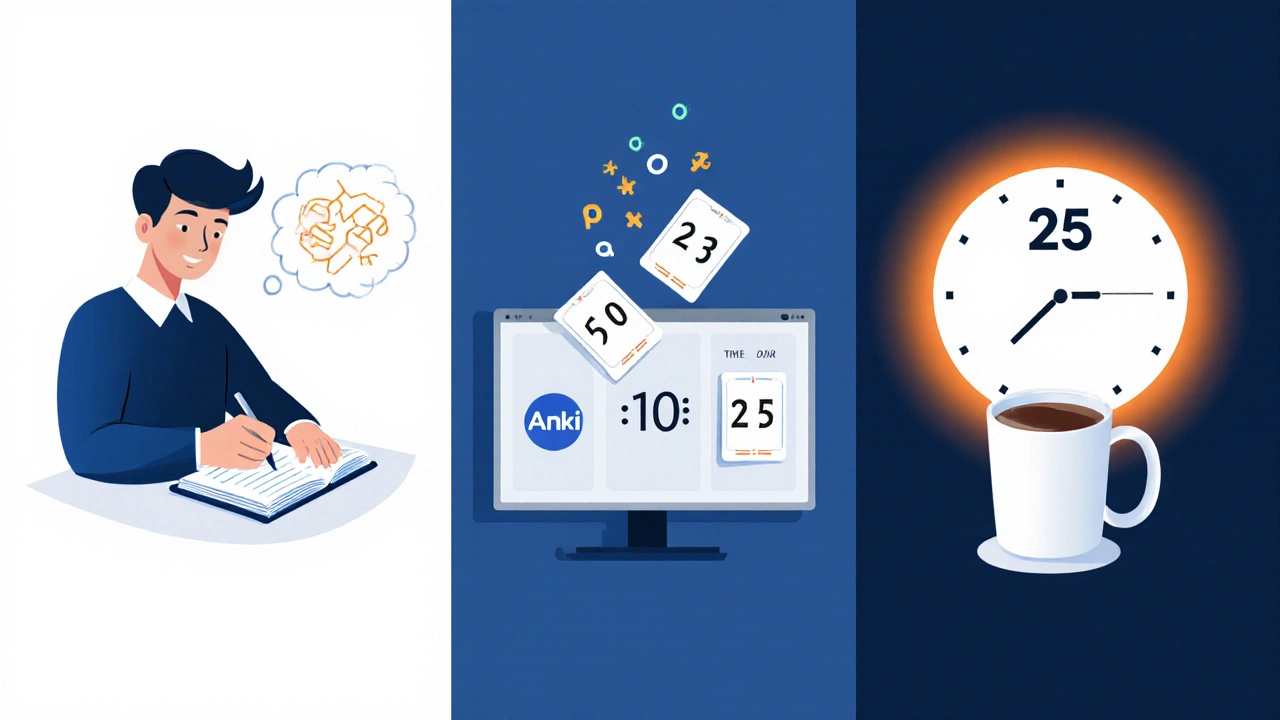Learning Technique Estimator
Estimate Your Learning Outcomes
Input your study time and technique to see how much knowledge retention you can expect based on evidence-based methods from the article.
Estimated Retention Gain
How This Works
Spaced Repetition
Review information at increasing intervals to combat forgetting. +60% retention
Learn moreEver felt that the world offers more knowledge than you can possibly absorb, yet you’re determined to stay ahead? Mastering the art of learning on your own isn’t about cramming facts; it’s about crafting a disciplined, elegant system that turns curiosity into competence. Below is a practical roadmap that any modern gentleman can adopt to sharpen his mind as meticulously as he sharpens his attire.
Key Takeaways
- Define clear, purpose‑driven learning goals before diving in.
- Adopt a growth mindset and treat challenges as opportunities.
- Use active recall and spaced repetition to cement knowledge.
- Structure study sessions with the Pomodoro technique for focus.
- Maintain a learning journal and digital notes to track progress.
- Seek mentorship and peer feedback to refine your approach.
Understanding Self‑Directed Learning
Self‑directed learning is a disciplined approach where the learner sets goals, identifies resources, monitors progress, and evaluates outcomes independently. In the gentleman’s world, this mirrors tailoring a suit: you choose the fabric, decide on the cut, and oversee each stitch until the final fit meets your standards.
The first step is a candid audit of what you truly wish to master-whether it’s a new language, a financial skill, or a deeper understanding of philosophy. Clarity here prevents wasted effort and aligns the learning journey with your broader life ambitions.
Building the Right Mindset
Adopting a growth mindset the belief that abilities can be developed through dedication and effective strategies is the psychological cornerstone of self‑improvement. Unlike a fixed mindset, which views talent as static, a growth mindset invites you to view setbacks as data points.
For a gentleman, this means treating a failed presentation not as a verdict on your competence but as a rehearsal that identified specific areas for refinement-much like noticing a loose cufflink after a meeting.

Core Study Techniques
While many methods promise quick results, three stand out for their proven efficacy and compatibility with a busy professional schedule.
Active Recall
Instead of rereading notes, challenge yourself to retrieve information from memory. For example, after reading a chapter on financial ratios, close the book and write down the formulas you recall. This effortful retrieval strengthens neural pathways far more than passive review.
Spaced Repetition
Combine active recall with a spaced schedule. Spaced repetition a learning technique that schedules review sessions at increasing intervals to combat forgetting leverages the brain’s natural forgetting curve. Tools like Anki or a simple spreadsheet can automate the intervals, ensuring you revisit material just before it fades.
Pomodoro Technique
Time‑boxing your study into 25‑minute blocks followed by a 5‑minute pause creates a rhythm that sustains concentration. The brief rest prevents mental fatigue and mirrors the disciplined intervals of a well‑executed workout.
Organising Knowledge
A gentleman’s study environment should reflect order and purpose. Two complementary practices help maintain that elegance.
Digital Note‑Taking
Use a single, searchable repository-such as Notion or Obsidian-to capture ideas, citations, and reflections. Tag each note with clear categories (e.g., "Leadership", "Investing", "Language") and link related concepts, creating a personal knowledge graph that grows organically.
Learning Journal
Beyond digital archives, a handwritten learning journal a daily log where you record goals, insights, challenges, and reflections reinforces commitment. A pocket Moleskine placed on your desk invites quick entries after each study session, turning abstract progress into tangible momentum.
Deliberate Practice
Simply logging hours does not guarantee mastery. Deliberate practice focused, goal‑oriented training that isolates weak points and provides immediate feedback is the engine behind elite performance, be it in music, sport, or business.
Identify a specific element you wish to improve-say, negotiating tactics. Break it down into sub‑skills: opening statements, objection handling, closing techniques. Practice each sub‑skill in simulated scenarios, record yourself, and critique the performance against a checklist.
Leveraging Mentorship & Community
Even the most self‑reliant gentleman appreciates the value of seasoned counsel. A mentor shortens the learning curve by sharing shortcuts, warning against common pitfalls, and offering perspective that you might overlook in isolation.
Seek mentors who embody the qualities you admire-perhaps a senior partner at your firm or an experienced entrepreneur. Structure the relationship: propose a quarterly coffee, bring a focused agenda, and respect their time.
Beyond one‑on‑one mentorship, consider joining a small, like‑minded study group. The collective accountability and exchange of resources enrich the experience without diluting individuality.

Maintaining Momentum Over Time
Habit formation is the silent arbiter of long‑term success. Anchor new study rituals to existing routines-read a chapter of a classic after your morning shave, or review flashcards during your commute.
Optimise the physical environment: a tidy desk, soft lighting, and a modest cup of tea create a sanctuary for concentration. Remove digital distractions by enabling "focus mode" on devices and designating a specific study zone within your home or office.
Periodically reassess goals. Every three months, review your learning journal, adjust objectives, and celebrate milestones-perhaps with a new accessory that symbolizes progress.
Comparing Popular Learning Techniques
| Technique | Retention Gain (% over baseline) | Average Weekly Time Required | Best For |
|---|---|---|---|
| Active Recall | +45% | 3-4hrs | Complex concepts |
| Spaced Repetition | +60% | 2-3hrs (plus review) | Vocabulary, facts |
| Pomodoro (25‑min blocks) | +30% | 4-5hrs | Long study sessions |
| Deliberate Practice | +70% | 5-6hrs | Skill‑based mastery |
Putting It All Together: A Sample Week
- Monday - Morning: 25‑minute Pomodoro reviewing language flashcards (spaced repetition). Evening: Write reflections in learning journal.
- Tuesday - Midday: 45‑minute active recall session on investment principles. Night: Update digital notes with new insights.
- Wednesday - Afternoon: 60‑minute deliberate practice of public speaking with a friend, record and critique.
- Thursday - Morning: Review mentor feedback, set next week’s objectives.
- Friday - Evening: Light reading of a classic philosophy text, note three takeaways.
- Weekend - Saturday: Join a peer study group for a 90‑minute collaborative problem‑solving session.
- Sunday - Reflect: Summarise weekly progress in journal, adjust goals for the coming week.
Frequently Asked Questions
How much time should I realistically allocate to self‑learning each week?
Start with 5-8hours spread across the week, using focused Pomodoro blocks. As the habit solidifies, you can comfortably increase to 10-12hours without compromising work performance.
Can I rely solely on digital tools for learning?
Digital tools excel at organisation and spaced repetition, yet a handwritten journal adds tactile reinforcement and encourages deeper reflection. A hybrid approach balances efficiency with mindfulness.
What if I hit a plateau in progress?
Plateaus often signal a need for varied practice. Introduce deliberate practice, seek new perspectives from a mentor, or switch to a complementary learning modality (e.g., from reading to teaching).
How do I choose the right learning resources?
Prioritise sources with clear structure, credible authorship, and practical examples. For professional topics, reputable industry publications or university‑level open courses are ideal.
Is it necessary to have a mentor?
While not mandatory, a mentor accelerates learning by offering feedback and shortcuts. Even occasional guidance-perhaps a quarterly coffee-can make a noticeable difference.
Learning is a lifelong gentleman’s pursuit, akin to perfecting a cufflink or polishing a watch. By defining goals, embracing proven techniques, and surrounding yourself with thoughtful counsel, you turn self‑study into an art form that continuously elevates every facet of your life.

